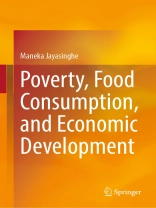This book investigates the relationships between economies of scale in food consumption and a number of socio-economic and demographic characteristics of households and household behavioural choices since food is the major share of household expenditure for poor households. The characteristics considered comprise household size, location, income, and gender of the head of household while the behavioural choices considered comprise the decision to consume home-grown food and the decision to adopt domestic technology to aid food preparation and consumption.
The book proposes two theoretical models to rationalize the role of the consumption of home-grown food and the adoption of domestic technology in enhancing economies of scale in food consumption. Econometric models are also used to empirically test the validity of the two theoretical models while adjusted poverty estimations are derived numerically using the estimated equivalence scales. Although data used inapplying these techniques are based on four Household Income and Expenditure Surveys conducted by the Department of Census and Statistics (DCS) in Sri Lanka, the methodology can be used for similar analysis in relation to any other country.
Table des matières
Introduction.- Consumption economies of scale and Engel equivalence scales.- Socio-economic and demographic characteristics of Sri Lankan households.- Link between income and economies of scale.- Economies of scale in home-grown food consumption.- Implications of access to electricity on food consumption economies of scale and household welfare.- Domestic technology adoption and consumption economies of scale.- Gender, food consumption economies of scale and poverty.- Conclusion and policy implications.
A propos de l’auteur
Maneka Jayasinghe is Senior Lecturer in Economics and Head of Business Discipline in the Asia Pacific College of Business and Law at Charles Darwin University, Darwin, Australia. She received her B.A. in Economics from the University of Colombo (Sri Lanka), Masters in Public Policy from National University of Singapore (Singapore), and her Ph.D. in Economics from Griffith University (Australia). Prior to joining academia, Maneka has also worked at German Technical Cooperation (GIZ) and UNICEF, Colombo, Sri Lanka. She has published a number of papers in international refereed journals, such as Energy Economics, Applied Economics, Social Indicators Research, Journal of Happiness Studies, and Food Policy, in the area of poverty, well-being and consumption economics. She is co-author of ’Household demand for consumer goods in developing countries: A comparative perspective with OECD countries’ to be published in 2022.












